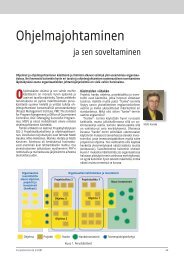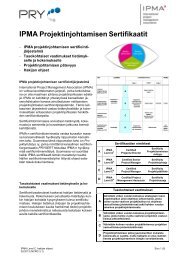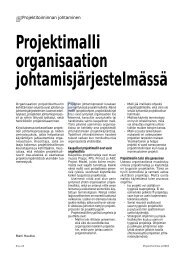Boundary activities and readiness for ... - Projekti-Instituutti
Boundary activities and readiness for ... - Projekti-Instituutti
Boundary activities and readiness for ... - Projekti-Instituutti
Create successful ePaper yourself
Turn your PDF publications into a flip-book with our unique Google optimized e-Paper software.
Discussion<br />
internal validity, especially regarding the proposed associations between<br />
the constructs of boundary <strong>activities</strong> <strong>and</strong> <strong>readiness</strong> <strong>for</strong> change program<br />
implementation, as well as the proposed effects of the identified contextual<br />
factors. While the longitudinal approach has supported the identification of<br />
cause <strong>and</strong> effect (Meyer, 2001), further research is required to validate the<br />
proposed associations.<br />
External validity refers to the degree the findings <strong>and</strong> conclusions of the<br />
study can be transferred or have applicability in other contexts. In<br />
qualitative research, the method of such generalization is analytical or<br />
theoretical instead of statistical (Dubois & Gadde, 2002; Yin, 1994).<br />
Although the basic assumption behind the current study is that change<br />
programs are highly contextual, the results are still believed to have<br />
relevance in other contexts. In the present study, the use of three cases<br />
instead of just a single case study is assumed to strengthen external validity<br />
(Eisenhardt, 1989; Yin, 1994). The main findings of the study are expected<br />
to apply to other similar organizations facing similar challenges to mobilize<br />
change programs. The extent to which similar observations apply to<br />
organizations that are more mature in terms of mobilizing change programs<br />
requires more investigation.<br />
The abductive case study approach, where existing, previously reported<br />
concepts have been adopted <strong>and</strong> accommodated in the study, <strong>and</strong> where<br />
support <strong>for</strong> the empirical findings has been actively sought from previous<br />
studies, may improve the generalizability of the results. To support the<br />
assessment of generalizability, considerable emphasis has been put to<br />
describing the sampling criteria, each selected case <strong>and</strong> its context in detail<br />
throughout the research process, within the limits set by the anonymity of<br />
the cases. Still, in line with Meyer (2001), it is largely left to the reader to<br />
judge the applicability of the research in other contexts.<br />
Reliability means that if the study was replicated in the same (or similar)<br />
context, its findings would be repeated. To improve reliability in the present<br />
study, the research approach, including case selection, data collection, <strong>and</strong><br />
analysis methodology, has been made transparent to the reader by detailed<br />
description (Yin, 1994). Although the anonymity of the studied cases may<br />
limit the reader’s ability to assess the findings, the confidential nature of the<br />
research has enabled the in<strong>for</strong>mants to engage in more open discussion of<br />
the challenges related to change initiation, presumably improving the<br />
reliability of the findings. The abductive approach of the current study may<br />
pose challenges <strong>for</strong> its replicability, since the research framework has<br />
evolved during the research process in the interplay between empirical<br />
findings <strong>and</strong> existing theories. Although all the intermediary results <strong>and</strong><br />
conclusions are not presented to the reader, the interview outlines utilized<br />
208









